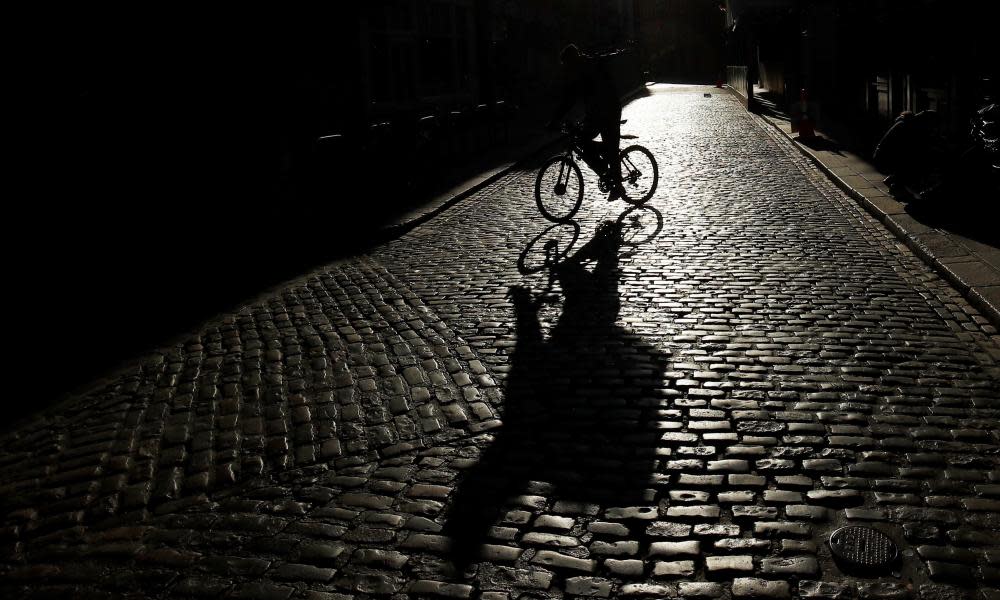Ireland goes quiet as public adapt to coronavirus lockdown

A nationwide lockdown has left Ireland’s public spaces hushed and deserted amid overwhelming public support for extreme measures to control the coronavirus pandemic.
Central Dublin and other usually bustling urban centres were like ghost towns on Sunday on the second day of sweeping restrictions that are to last two weeks, until 12 April.
The vast majority of the population appeared to be following appeals to stay at home except to buy food, care for vulnerable people, do work deemed essential or briefly exercise within 2km (1.2 miles) of home.
Symptoms are defined by the NHS as either:
a high temperature - you feel hot to touch on your chest or back
a new continuous cough - this means you've started coughing repeatedly
NHS advice is that anyone with symptoms should stay at home for at least 7 days.
If you live with other people, they should stay at home for at least 14 days, to avoid spreading the infection outside the home.
After 14 days, anyone you live with who does not have symptoms can return to their normal routine. But, if anyone in your home gets symptoms, they should stay at home for 7 days from the day their symptoms start. Even if it means they're at home for longer than 14 days.
If you live with someone who is 70 or over, has a long-term condition, is pregnant or has a weakened immune system, try to find somewhere else for them to stay for 14 days.
If you have to stay at home together, try to keep away from each other as much as possible.
After 7 days, if you no longer have a high temperature you can return to your normal routine.
If you still have a high temperature, stay at home until your temperature returns to normal.
If you still have a cough after 7 days, but your temperature is normal, you do not need to continue staying at home. A cough can last for several weeks after the infection has gone.
Staying at home means you should:
not go to work, school or public areas
not use public transport or taxis
not have visitors, such as friends and family, in your home
not go out to buy food or collect medicine – order them by phone or online, or ask someone else to drop them off at your home
You can use your garden, if you have one. You can also leave the house to exercise – but stay at least 2 metres away from other people.
If you have symptoms of coronavirus, use the NHS 111 coronavirus service to find out what to do.
Source: NHS England on 23 March 2020
The state has deployed hundreds of extra police on the streets and passed laws to enforce the restrictions – violators can be arrested, fined €2,500 (£2,241) and jailed for six months.
But the hope is that community spirit will ensure compliance. “I’m appealing to every man, woman and child to make these sacrifices for the love of each other … show that you care for your family and friends: stay home,” the taoiseach, Leo Varadkar, said on Friday when he announced the restrictions.
Neon signs reminding people about not grouping together and keeping 6ft (1.8 metres) apart have sprouted across Ireland. The finance minister, Paschal Donohoe, encouraged the mixed martial arts fighter Conor McGregor to reinforce the message to his social media followers.
New neon signs up around Glenageary and Forty Foot to nudge walkers and swimmers apart. pic.twitter.com/CebkfBugTP
— Rory Carroll (@rorycarroll72) March 26, 2020
An opinion poll published on Sunday showed 97% of people agreed that the government should have powers to detain those with the virus for as long as necessary if they refused to self-isolate. About 95% agreed it should also be able to stop people travelling.
The Business Post/Red C poll was taken before Varadkar’s speech but after a series of other measures – including closure of schools, universities and businesses and a ban on sporting events – that have been phased in since 13 March.
“The support is clearly based on the overwhelming concern evident amongst the public that the virus could have a long-lasting impact on the economy,” Richard Colwell, the chief executive of Red C, wrote in the Business Post.
The poll found a resurgence in support for Varadkar’s ruling Fine Gael party. In a general election last month it slumped to 21%, behind Sinn Féin and Fianna Fáil, but now has 34% support, ahead of its two main rivals. Instead of entering opposition, as originally expected, Fine Gael’s caretaker administration is talking to Fianna Fáil and smaller parties about forming a new government.
Ireland has recorded 2,615 cases of Covid-19 infections and 46 deaths.
Health Service Executive chiefs told a media briefing they did not know when the pandemic would peak but were planning on mid-April. They will ask members of the public to opt into a mobile phone tracking app to facilitate contact tracing of people who may be infected.
Northern Ireland on Sunday recorded another 86 cases of infection, bringing its total to 410, and six deaths, pushing the death toll to 21.
The region introduced strict new restrictions on Saturday night that aligned it with the rest of the UK.
Simon Byrne, the chief constable of the Police Service of Northern Ireland, said his force would apply new laws to enforce the restrictions, including fines of up to £5,000, “only when absolutely necessary”.


